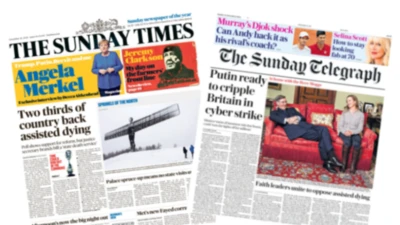We've updated our Privacy and Cookies Policy
We've made some important changes to our Privacy and Cookies Policy and we want you to know what this means for you and your data.
US hails 'constructive' direct Middle East peace talks
Israeli and Palestinian leaders have held their first direct negotiations in nearly two years, in Washington.
The US Middle East envoy said the talks, between Israeli PM Benjamin Netanyahu and Palestinian leader Mahmoud Abbas, had been "constructive".
Both sides have agreed to meet again in the Middle East in two weeks.
As the talks opened, US Secretary of State Hillary Clinton told Mr Abbas and Mr Netanyahu they had the "opportunity to end this conflict".
Mr Netanyahu said painful concessions from both sides would be needed.
Mr Abbas called on Israel to end all settlement construction and lift the blockade of the Gaza Strip.
The talks at the US state department, the first such negotiations in 20 months, began with a pledge of "full and active support" from the US.
They had been initiated by US President Barack Obama, who gave them a one-year deadline.
He has said the goal is a permanent settlement that ends the Israeli occupation of territory captured in 1967, and an independent, democratic Palestinian state existing peacefully beside Israel.
'Hurdles'
Opening the negotiations, Mrs Clinton said the US had "pledged its full support to these talks and we will be an active and sustained partner", but said Washington would not impose a solution.
"Mr Prime Minister, Mr President, you have the opportunity to end this conflict and the decades of enmity between your peoples once and for all," she said.
"The core issues at the centre of these negotiations - territory, security, Jerusalem, refugees, settlements and others - will get no easier if we wait, nor will they resolve themselves."
Speaking after Mrs Clinton, both Mr Netanyahu and Mr Abbas acknowledged the difficulty of the task ahead.
"This will not be easy," Mr Netanyahu said. "True peace, a lasting peace, will be achieved only with mutual and painful concessions from both sides."
Mr Abbas said: "We do know how hard are the hurdles and obstacles we face during these negotiations - negotiations that within a year should result in an agreement that will bring peace."
The leaders also raised two of the issues that are central to the talks: security for the Israelis, and Jewish settlement construction on Palestinian territories.
"We call on the Israeli government to move forward with its commitment to end all settlement activities and completely lift the embargo over the Gaza Strip," Mr Abbas said.
Mr Netanyahu said "a genuine peace must take into account the security needs of Israel". He also repeated the demand that the Palestinians recognise Israel as a Jewish state.
After their statements, Mrs Clinton, Mr Abbas, Mr Netanyahu and the US envoy to the Middle East talks, George Mitchell, broke off for talks away from the media.
Mr Mitchell emerged to say that Mr Abbas and Mr Netanyahu were talking alone. He said relations between the two men were "cordial" and there was a "constructive and positive mood".
He said the two leaders had agreed to hold further talks in the Middle East on 14-15 September, then about every two weeks after that.
It had already been agreed, Mr Mitchell said, that the two sides would work to reach a framework agreement on all the issues dividing them that would pave the way for a comprehensive treaty.
Hamas promise
Highlighting the difficulties facing the two sides, the armed wing of the Palestinian movement Hamas said it carried out two attacks this week that killed four Israeli settlers and wounded two others in the West Bank.
A 12-year-old Israeli girl was also slightly injured on Thursday when stones were thrown at the car in which she was travelling in the West Bank.
The Palestinians are divided by a bitter feud between Hamas, which controls the Gaza Strip, and the more-moderate Fatah, to which Mr Abbas belongs.
Hamas, excluded from the talks because its authority is not recognised by Israel, the US or the European Union, has promised to continue to target Israelis.
It is hard to see how there can be peace between Israelis and Palestinians, unless Fatah and Hamas sort out their differences first, the ґуПуґ«ГЅ's Jon Donnison in the Gaza Strip says.
Top Stories
More to explore
Most read
Content is not available








